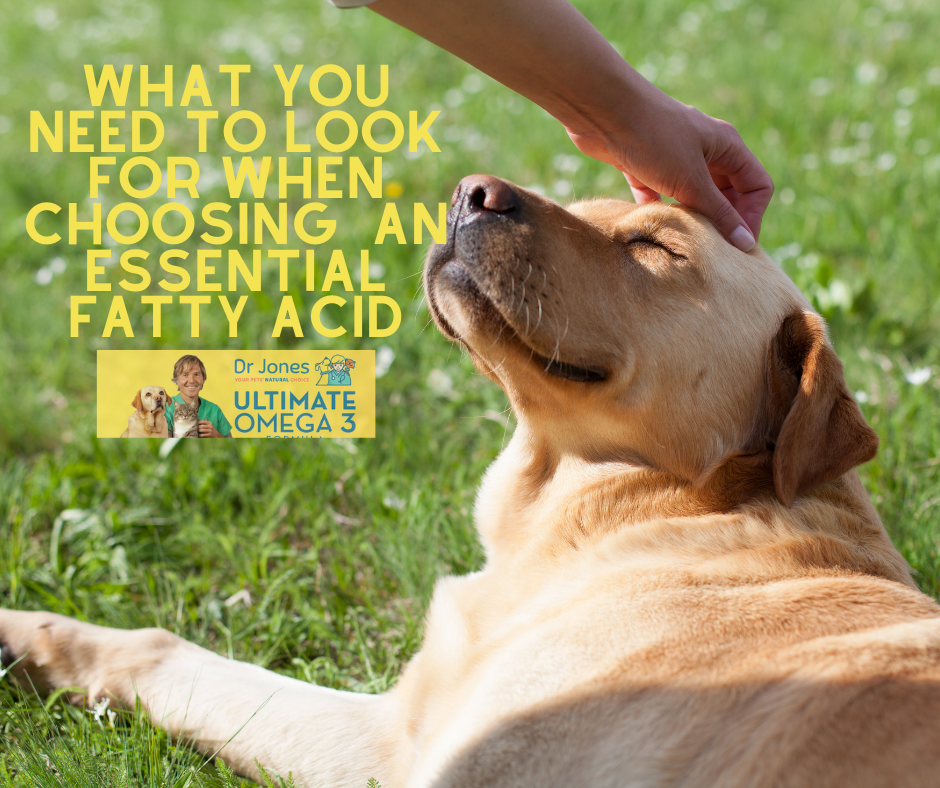What You Need to Look for When Choosing an Essential Fatty Acid

Omega-3 Fatty Acids are one of the most important supplements in veterinary medicine. Dogs and cats require omega-6 and omega-3 fatty acids in the diet because they cannot produce these essential fatty acids on their own. Omega-3 fatty acids can help reduce the risk or assist with issues such as:
- Inflammatory Skin Disease
- Osteoarthritis
- Heart Disease, Kidney Failure
- Cognitive Dysfunction, Anxiety Disorders
- Chronic Inflammation and Auto-Immune Diseases ( ie Lupus, AIHA, ITP)
- Cancer prevention and Treatment
- Fatty Liver Disease (Hepatic Lipidosis)
Quality of Supplement
To start, when supplementing a diet with fatty acids, it is important to choose a quality supplement. In choosing a fish oil supplement, there are potential risks for nutrient excess (mainly vitamins A and D) and toxin exposure, such as mercury with some fish oil supplements. The health benefits of fish oil are believed to derive principally from two omega-3 fats: eicosapentaenoic acid (EPA) and docosahexaenoic acid (DHA).
What about Flaxseed Oil?
Flaxseed oil contains a third, plant-based omega-3, alpha-linolenic acid (ALA). But, the main problem with ALA in flax is that to have the positive effects attributed to omega-3s, it must be converted by a limited supply of enzymes into EPA and DHA. As a result, only a small fraction of it has omega-3 effects -10%/15%, possibly less.
Fish oil, while rich in healthy polyunsaturated fatty acids, can protect against certain types of cancer, but many types of fish are also contaminated by waterborne toxins. A new study by San Diego State University researchers found that toxin-contaminated fish oil loses much of its cancer-preventative properties.
Are Fish and Shellfish Safe?
In 2004, the U.S. Food and Drug Administration issued a recommendation that young children and women who are pregnant or could become pregnant should avoid eating large amounts of fish and shellfish. Nearly all fish and shellfish contain mercury, which is especially hazardous for developing children.
In recent years, the agency has expanded the warning to note that fish also frequently contain dangerous chemicals called polychlorinated biphenyls, or PCBs. PCBs belong to a class of chemicals—known at persistent organic pollutants (POPs) — that break down extremely slowly in the environment.
“Large fish are now mostly the source of POP contamination for humans,” said the new study’s lead author, San Diego State University nutrition professor Mee Young Hong.
Alternative Omega-3: Krill Oil
Krill having a very short lifespan and being very low on the food chain have little to no measurable environmental toxins. Krill oil provides similar EFA profile as fish oil, but without the toxic risk.
So, I have created my own formula: Dr. Jones’ Ultimate Omega 3 Formula for Dogs and Cats – a full spectrum organic krill oil supplement high in EPA/DHA, phospholipids, and astaxanthin.
https://www.theomega3supplement.com/
Dosages: 500mg/capsule
- Up to 20lbs 1/day
- 20-50lb dog, 2/day
- 50-80lbs 3/day
I have an upcoming webinar next week and I’ll be covering more information about Omega-3’s, sign up below!